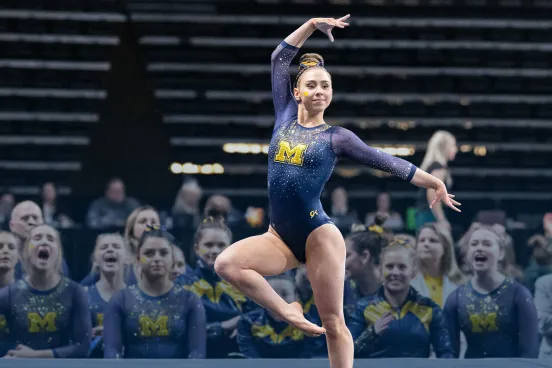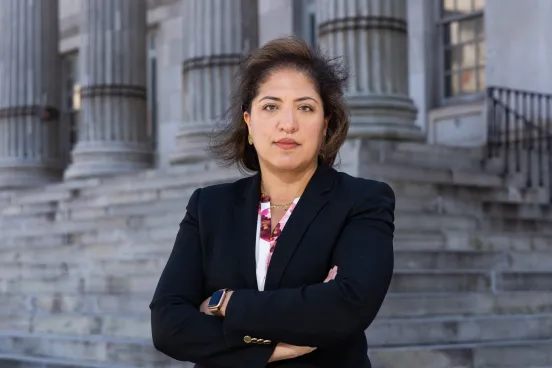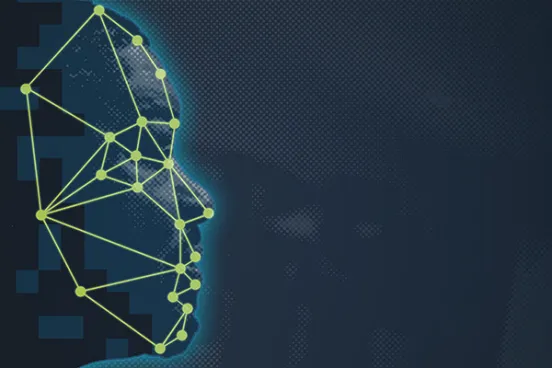
The crimes are harrowing: a young man tracked and murdered while jogging; two shoppers shot to death by a stranger at a grocery store; a defenseless, unconscious man’s head repeatedly stomped on.
In each case, the perpetrators were motivated by prejudice against Black people and convicted on federal hate crimes charges. Christopher Perras, ’11, prosecuted each case in his capacity as a special litigation counsel in the Civil Rights Division at the Department of Justice who specializes in hate crimes.
Determining whether racism or other prejudice was a factor in a crime is especially sensitive when a case has made national headlines. Prosecutors can face immense pressure to bring charges. However, that pressure doesn't influence their ultimate decision, and not every case that Perras investigates leads to a hate crimes prosecution.
But if the evidence suggests that prejudice played a role in the crime, Perras and his colleagues pursue and prosecute high-profile cases just as they would any other.
Under a microscope
Ahmaud Arbery, a young Black man, was murdered in February 2020 while jogging in a suburban neighborhood in Georgia. Three men, all of them white, erroneously believed, based on the color of his skin, that Arbery was responsible for several recent thefts in the neighborhood and chose to pursue him. They cornered Arbery with their trucks and then shot and killed him in the ensuing struggle.
More than two months later, video from the confrontation went viral on social media and garnered national news coverage. The killing provided yet another example of America's struggle with racism and violence. The men—who had been allowed to walk away from the scene of the crime—were arrested days after the video appeared online. The DOJ assigned Perras and two other seasoned prosecutors to look into the case.
“Just because somebody was killed doesn't mean it's a hate crime, so we had to decide if we thought it was motivated by race and then determine if we can prove it,” he says. “I was not under the illusion that this was some slam-dunk case. We had every reason to believe it was going to be a tough one.”
Unlike some hate crimes, there wasn’t overt evidence that the crime was racially motivated; the defendants were not, for example, members of a hate group or shouting racial slurs during the chase. But as Perras and his colleagues looked at the defendants’ phones and social media and talked to their friends, families, and co-workers, a clear picture began to emerge.
“The more we learned, the more convinced we were that this murder was about race, and it was pretty clear how these men felt about Black people. There was a simmering resentment beneath the surface,” he says. The jury agreed, and all three men were found guilty of committing federal hate crimes. (The men were also convicted of felony murder and other offenses in Georgia’s state courts.)
“It was important for the family and for frankly a lot of people in America for there to be a verdict that confirmed that this was what you thought it was. This was about race. At the end of the day, this would not have happened if Ahmaud had been white.”
Cases charged with emotion
Being immersed in the details of hateful and violent crime can be emotionally draining. Perras says that one of the most difficult prosecutions he has worked on was the death of Kedarie Johnson, a gender-fluid teenager who was kidnapped, tortured, and murdered by two men in a small Iowa town.
After looking into the case, Perras was given special dispensation by then–US Attorney General Jeff Sessions to serve as a special assistant county attorney and help local prosecutors with their digital forensics and other aspects of the state’s murder investigation and prosecution.
Using cell site data, digital media on the defendants’ phones, and text messages, Perras was able to reconstruct the evening of the murder and paint a step-by-step portrait of the crime. Perras joined the state prosecution team for the trials of the two men, who were convicted of first-degree murder.
“Everyone in Kedarie’s life thought he was a joy, and to be murdered like that for no reason, it’s just heartbreaking,” Perras says. “It’s not the gruesome crime scene photos that are upsetting. It’s getting to know the friends and family of the victims, and the sadness of knowing that this didn’t need to happen.”
Preventive investigations
Since August 2022, Perras has served as a liaison to the newly created Domestic Terrorism Unit in the DOJ’s National Security Division. This role requires him to work with prosecutors and FBI agents on domestic terrorism cases that overlap with broader civil rights issues, such as racially motivated mass shootings.
“If someone is shot and killed, it’s rewarding to hold the perpetrator responsible, but mostly you just wish it hadn’t happened,” says Perras. Domestic terrorism investigations, however, provide the opportunity to be more proactive and take action that may prevent future harm. Perras collaborates with other prosecutors and law enforcement on investigations that balance the need to bring in a suspect as quickly as possible while also building a case that will hold up in court.
“This work requires a lot of strategic decision-making to ensure we are serving the public interest while making sure dangerous people are off the streets for as long as possible,” Perras says. “It's one of the first times I've been able to participate in disrupting things before they happen, and it’s gratifying to be involved before people get hurt.”
A true calling
When Perras decided to pursue the law, he wasn’t sure where his career would take him. But that quickly changed during a summer internship with the US Attorney's Office in Massachusetts after his 1L year.
“I was assigned to the office's civil rights attorney, and he mainly prosecuted police misconduct and hate crimes,” Perras recalls. “It exposed me to this whole new world, and I remember thinking, ‘Wow, prosecuting bigots and corrupt cops? Sign me up.’”
Perras went on to intern at the Criminal Section of the Civil Rights Division of the DOJ the following summer. He remembers telling his supervisor that he was going to apply to that office as many times as it took until they hired him.
After clerking for two years—on the US District Court for the District of Massachusetts and the US Court of Appeals for the Fifth Circuit—he rejoined the Criminal Section of the Civil Rights Division through the DOJ Honors Program.
Perras feels as enthusiastic as ever about the work. Although he served as an acting deputy chief for six months in 2021—he helped manage civil rights enforcement for a quarter of the US, staffing cases and supervising multiple prosecutions—he’s happy where he is. With the balance of a national caseload and helping to mentor and oversee younger attorneys in the office, he has found his calling.
“I’ve been working at the DOJ for 10 years, and I’ve loved every minute of it,” Perras says. “It’s hard work, but you really care about the cases you work on, and it’s interesting and exciting. There’s never a dull moment.”







